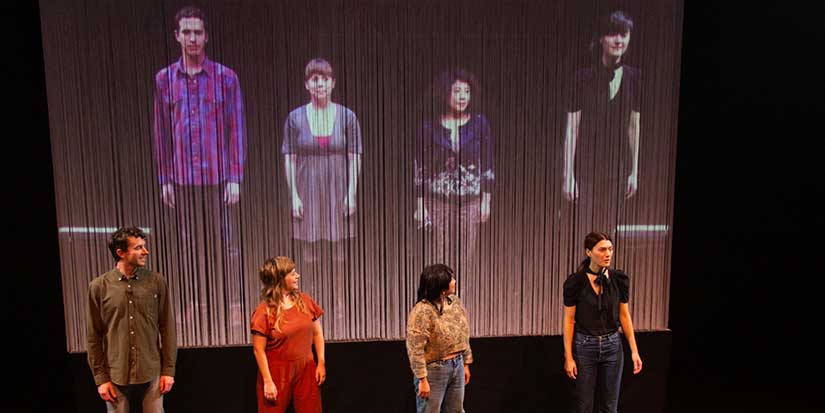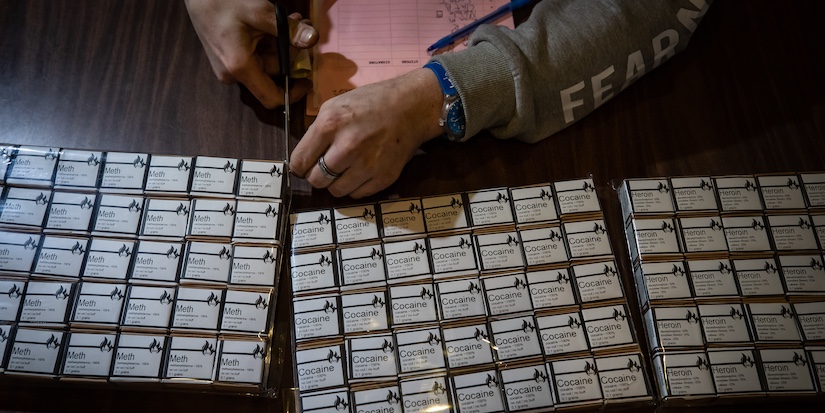Arts & Culture
“KISMET” play shares wisdom on how to cope

By Hannah Scott, Local Journalism Initiative reporter
Published 2:00 PST, Thu January 23, 2020
Last Updated: 2:13 PDT, Wed May 12, 2021
—
Sometimes, life gets hard.
How we cope forms connections.
In KISMET, things have changed, premiering in February at the Cultch, “you’re constantly just being taken on these different journeys, whether it be through sound or sight or just excellent acting,” says Emelia Symington Fedy of the show’s multimedia format. “Through the storytelling we’re building tension, and we’re getting people invested in these folks as real humans.”
Symington Fedy along with Daryl King, Anita Rochon and Hazel Venzon is one of the creators and performers of the play. It was conceived as a follow-up piece to the creative team’s original play, KISMET one to one hundred, which premiered 10 years ago. Then in their late 20s and early 30s, they interviewed 100 people between the ages of one and 100. They wanted to know what those people believed in.
When they went out to interview the same people again, creator and performer Symington Fedy says their main question was different: “Tell us how you get through the goddamn day.”
She says that audience members don’t need to have seen the original KISMET play to understand this one.
When revisiting the original interviewees—with whom the KISMET team kept in touch over the years—they found some changes in the people they’d known.
One girl, who was six when originally interviewed, is now a teenager. Ten years ago she told detailed stories about butterflies; now she’s coping with the death of her best friend.
“I was shocked that life gets as hard as it does,” says Symington Fedy. She adds, however, that she has experienced similarly challenging events in her own life.
“We have five kids between us, we have parental death—we’ve had a lot of changes in our little artistic circle too. It’s a powerful human exploration on how people cope and survive life.”
Not all the stories are sad, though. Symington Fedy describes one interviewee, an Indigenous man who struggled to find his place in terms of career and culture, who has gone through a powerful journey of self-discovery.
“Ten years later he’s leading powwows and teaching his community his traditional Indigenous language. For him, the past 10 years have been this resurgence of his Indigenous identity.”
The show is presented in a multimedia format, blending sound, video, acting and visuals.
Since the original interviewees were up to age 100, some have inevitably passed away since the first KISMET project. Because the team stayed in contact, they knew about people’s passing as it happened. They shifted their focus, in some cases, to the partners of those who’d died.
“It’s who’s left behind—it’s the partners who were left behind and how they’re coping with being alone,” says Symington Fedy.
KISMET, things have changed connects people through stories and similar lived experiences, particularly those that have been challenging. The show is produced in collaboration with The Chop theatre, a Vancouver company founded in 2006 by Symington Fedy and Rochon.
The show is part of the Cultch’s Femme Series, which features female-identifying artists and celebrates female experiences. Symington Fedy says that she and Rochon identify as feminist artists.
“We make art in a very collaborative, spacious way; we integrate people’s families into the art; we think about childcare and who pays for childcare,” says Symington Fedy.
The play aims to draw audiences into the worlds of the interviewees, building investment in their real-life stories.
“I remember seeing KISMET one to one hundred 10 years ago and feeling intrigued by the form and the sophistication of the storytelling,” says Heather Redfern, The Cultch’s executive director. “I am fascinated to see KISMET, things have changed because I feel like I am part of the journey of these people’s lives.”
The life journeys don’t stop after the play hits the stage. Symington Fedy says that many interviewees asked the creative team about a third project, saying “I’ll talk to you again in 10 years.”
If the sparse number of remaining tickets is any indication, there may well be a third KISMET installation.
“People want honest, real human stories,” says Symington Fedy. “It’s a very accessible play. You’re going to be moved. You’re going to feel attached.”
KISMET, things have changed is recommended for anyone age 10 and up. It plays at The Cultch (1895 Venables St.) from Feb. 4 to 8, and is part of the PuSh festival. Individual tickets can be purchased through The Cultch at 604-251-1363 or online at tickets.thecultch.com.






























